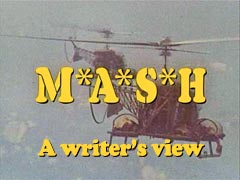M*A*S*H: A writer’s view. #5 in the series.
In one of my previous posts on M*A*S*H, I mentioned that the original cast, with its three distinct comedy double acts, could have carried on almost indefinitely, but that external forces prevented them. The old theologians liked to talk about the three great sources of temptation, the World, the Flesh, and the Devil; and one could make a pretty fair case that these three tempters broke up the three double acts and prepared the way for the series’ eventual decline. Actually, the frequent changes of cast were a mixed blessing for M*A*S*H. The exquisite structure of the original cast was broken up. On the other hand, new actors and new characters meant new situations that the writers could exploit; and since the writers themselves were replaced at a fairly steady rate (until the great climacteric of ’79, to be discussed later), there were always fresh approaches and new points of view in the scripts.
The third season, for instance, featured the first scripts by Linda Bloodworth and Mary Kay Place, the show’s first women writers; their chief contribution, perhaps, was to make the nurses more important to the stories, without using them merely as love interests or sexual foils for the surgeons. Mary Kay Place guest-starred in an episode she had co-written, ‘Springtime’, playing a nurse whom Radar inadvertently (and comically) seduces by reading her a horrible poem by ‘Ruptured Brooke’:
The damned ship lurched and slithered. Quiet and quick
My cold gorge rose; the long sea rolled; I knew
I must think hard of something, or be sick….Do I forget you? Retchings twist and tie me,
Old meat, good meals, brown gobbets, up I throw—
At which point Place throws herself at Radar, moaning, ‘You don’t give a girl a chance!’ Whereupon the rest of the poem (‘A Channel Passage’) is fortunately lost.
But the real genius of the middle years of M*A*S*H belonged to a veteran writing team that Larry Gelbart brought in for the third season: Jim Fritzell and Everett Greenbaum, who had cut their teeth in radio, and had worked in television since the beginning of that medium. Before he died, Greenbaum did a long interview for the Archive of American Television, which (among many other reminiscences) sheds much light on the process of writing for M*A*S*H.
Greenbaum and Fritzell, more than anyone except the show’s creators, had their fingers on the pulse of M*A*S*H; they understood the characters (and the armed forces) intimately. So the producers relied on them exclusively for the most difficult and delicate writing jobs of all: writing out old characters and introducing new ones whenever the cast was changed. [Read more…]








Recent Comments